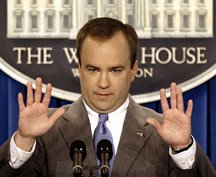Curtain Call

October, 2003
Q: Scott, you have said that you, personally, went to
Scooter Libby, Karl Rove and Elliot Abrams to ask
them if they were the leakers. Is that what
happened? Why did you do that, and can you describe
the conversations you had with them? What was the
question you asked?
MR. McCLELLAN: Unfortunately, in Washington, D.C.,
at a time like this, there are a lot of rumors and
innuendo. There are unsubstantiated accusations that
are made. And that's exactly what happened in the
case of these three individuals. They're good
individuals, they're important members of our White
House team, and that's why I spoke with them, so
that I could come back to you and say that they were
not involved. I had no doubt of that in the beginning,
but I like to check my information to make sure it's
accurate before I report back to you, and that's
exactly what I did.
Q: So you're saying -- you're saying categorically
those three individuals were not the leakers or did
not authorize the leaks; is that what you're saying?
MR. McCLELLAN: That's correct. I've spoken with
them.
July, 2005
Q: Scott, can I ask you this; did Karl Rove commit a
crime?
MR. McCLELLAN: Again, David, this is a question
relating to an ongoing investigation, and you have my
response related to the investigation. And I don't
think you should read anything into it other than
we're going to continue not to comment on it while
it's ongoing.
Q: Do you stand by your statement from the fall of
2003 when you were asked specifically about Karl
and Elliott Abrams and Scooter Libby, and you said,
"I've gone to each of those gentlemen, and they have
told me they are not involved in this" -- do you stand
by that statement?
MR. McCLELLAN: And if you will recall, I said that as
part of helping the investigators move forward on the
investigation we're not going to get into commenting
on it. That was something I stated back near that
time, as well.
Q: Scott, I mean, just -- I mean, this is ridiculous. The
notion that you're going to stand before us after
having commented with that level of detail and tell
people watching this that somehow you decided not
to talk. You've got a public record out there. Do you
stand by your remarks from that podium, or not?
December, 2005
“Is Scotty here? Where's Scotty?” Bush asked, half-
grinning, according to two people who were in the
meeting but asked not to be quoted by name because
they were discussing a private event. Bush scanned
the room for Scott McClellan, the White House press
secretary.
“I want to especially thank Scotty,” the president
said, looking at his aide. "I want to thank Scotty for
saying" -- and he paused for effect...
“Nothing.”
At which point everyone laughed and the president
left the room.
April, 2006
McClellan is a flea on the windshield of history. On
the podium, he performed his duty as a slow-flying
object swatted by a frustrated and flustered press
corps. Inexpressive, occasionally inarticulate and
displaying a limited vocabulary, his virtue was his
unwavering discipline in sticking to his uninformative
talking points, fending off pesky reporters, and
defending the president and all the president's men
to the last full measure of his devotion. Inside the
Bush White House, he was a non-player, a factotum,
the instrument of Karl Rove, Bush's chief political
strategist and deputy chief of staff. McClellan played
no part in the inner councils of state. He was the
blank wall erected in front of the press to obstruct
them from seeing what was on the other side.
McClellan's stoic façade was unmatched by a stoic
interior. He was a vessel for his masters, did
whatever he was told, put out disinformation without
objection, and was willing to defend any travesty. He
is the ultimate dispensable man.
ENCORE: Countdown's Tribute to Scotty


<< Home